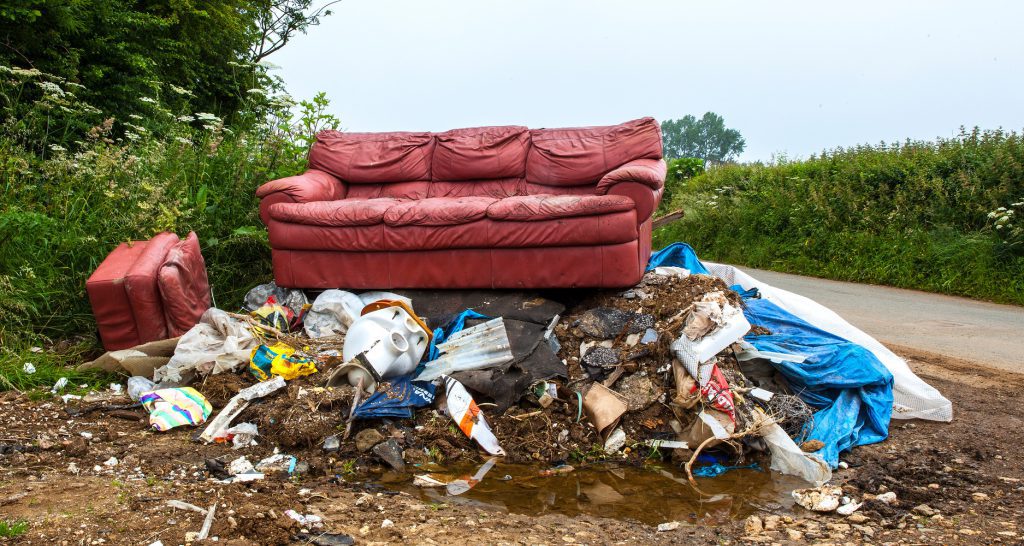What Is Fly-tipping?

What is fly-tipping? How do you report it? Who is responsible for the clean-up? And is there any way to protect yourself against it? Let’s find out.
Fly-tipping is an ongoing problem in the UK. Statistics show that there were 1.09 million fly-tipping incidents reported in the 2021/2022 year. Fly-tipping is expensive and inconvenient for land-owners who find themselves the victim of this offence.
What is fly-tipping in the UK?
Fly-tipping is the unauthorised disposal of waste or unwanted items on both public and private land. This could be anything from household waste, like a bag of rubbish, garden refuse or an old fridge, to commercial waste such as a truckload of builder’s rubble and asbestos. The reason for dumping is usually to avoid the cost of proper disposal.
Besides being unsightly, anti-social and polluting, fly-tipping can be detrimental to wildlife, and possibly pose a risk to public health.
Why is it called fly-tipping?
The word fly-tipping is a combination of the idiom “on the fly” and the word “tipping”.
Performing an action “on the fly” refers to doing it quickly, while in motion. This combined with the act of tipping something out results in “fly-tipping”.
What’s the difference between littering and fly-tipping?
Littering and fly-tipping might seem similar, but they’re not the same.
Littering involves improperly discarding materials, most commonly those associated with eating, drinking and smoking, and generally involves smaller items.
On the other hand, fly-tipping involves taking waste from where it was produced and deliberately disposing of it illegally, either by individuals or businesses. This waste is usually larger items and can be mixed materials.
What is considered as fly-tipping?
Fly-tipping includes the dumping of household waste, industrial waste, or commercial waste. It also includes other ‘controlled’ types of waste, such as garden refuse and domestic items such as large appliances, mattresses and old furniture. These forms of refuse can be solid or liquid and can be toxic.
It’s considered to be fly-tipping if waste is left in any area that is not a registered waste facility or container. Fly-tipping also includes leaving rubbish:
On the pavement anywhere, including in front or behind your home,Next to street bins,On the floor in communal bin areas, andOn the floor at recycling centres that do not accept the waste you brought.
Is fly-tipping only large amounts of waste?
The quantity of waste does not determine whether an act is considered fly-tipping. If any rubbish is illegally dumped on any land or water, it is fly-tipping.
Is fly-tipping a criminal offence? What is the penalty for fly tipping?
Yes, fly-tipping is a crime, and the penalties for fly-tipping will depend on the offence.
For small-scale cases, offenders can be given a fixed penalty notice of £400. Larger scale fly-tipping can incur a fine of up to £50,000. Offenders could also be sentenced to 12 months in prison if convicted in a magistrates court.
Conviction in a crown court could result in up to five years in prison and an unlimited fine. Vehicles used for fly-tipping can also be confiscated, and the registered owner of the vehicle can be liable for conviction.
Are you responsible if your waste is fly-tipped by a waste removal company?
Under section 34 of the Environmental Protection Act 1990, it’s the responsibility of the person who produces the waste to make sure that it’s disposed of legally and correctly.
Often, illegal waste removal businesses dump waste instead of disposing of it correctly. If your waste is fly-tipped and is traced back to you, you as the householder would be held responsible, no matter if you fly-tipped it or not.
The householder’s “duty of care” means that you have a legal obligation to make sure your waste is disposed of properly. For this reason, it’s vital that you check that the waste removal company you use is registered and legally disposing of the refuse.
What to do if someone fly-tips on your land
Being a victim of fly-tipping is more than an inconvenience. It can be expensive to deal with and, depending on the waste deposited, could pose an environmental risk.
Owners of commercial property and farmers can find themselves targets of fly-tipping because they often own land which is difficult to monitor.
The first thing to do is to record as many details of the dumped waste as possible, including taking photographs. This information will be useful when trying to investigate the incident.
Also, note down:
The date, time and place of the incident,A description of the waste, for example, black bin bags, garden waste, an old mattress, or liquid waste,The amount of waste,A description of any vehicles involved,Vehicle registration number, if possible.
Other useful information for report purposes is:
What type of land the waste was fly-tipped on, andAny potential negative effects that the waste is having or could have, such as harm to people, animals or the environment.
The next step is to report the incident (more on how to do that below).
If you’re insured for fly-tipping, contact your insurance provider who can guide you through making a claim. After this, you can proceed with the removal of the fly-tipped items, making sure to keep a record of your costs.
How to report fly-tipping
You can report fly-tipping by contacting your local authority, where you’ll find an online report form and a number to phone.
Is fly-tipping a police matter?
Yes. Fly-tipping is a serious criminal offence. If you witness fly-tipping in action, call 999 and report it as a crime in progress.
What happens when you report fly-tipping?
When a fly-tipping incident is reported, a waste enforcement officer will visit the site to assess and examine the waste. The aim is to find any evidence which can help authorities identify the offenders.
In the case of public land, the council will arrange for the removal of the waste.
If the land is privately owned, the authorities will inform the owner of the land, who is then responsible for removal.
How to remove fly-tipped waste from private property
Waste that has been fly-tipped on your private property is your responsibility to remove.
Once you have recorded the details of the fly-tipping incident and reported it, it’s recommended that you carry out a risk assessment on the waste before beginning removal, to ensure it is safe to handle. It might be that protective equipment is required or a specialist should be contracted to assist with specific waste, such as hazardous materials.
When arranging the removal, ensure that you use a registered waste carrier. If the waste you need removing is dangerous in any way, it is essential to use the services of someone licensed to transport and dispose of hazardous materials.
Removal should be arranged quickly. Piles of fly-tipped waste often act as an ‘invitation’ for more to be added.
Fly-tipping and insurance
Like any illegal occupation, fly-tipping can be expensive and time-consuming to sort out.
Some property owner insurance policies cover you in the case of fly-tipping, but others don’t. Whether a private or commercial landowner, it’s crucial that you check your insurance policy to see if the removal of fly-tipped waste is covered, and what the amount of cover is.
For farmers, there might be more comprehensive policies which can cover you for fly-tipping.
If you consider yourself to be at risk and you’d like to safeguard yourself against fly-tipping, or if you’ve been the victim of fly-tipping, it’s worth insuring yourself accordingly.
When to make a claim against fly-tipping
Before making a claim, you need to assess who is responsible for dealing with the fly-tipping.
Small-scale fly-tipping incidents on public land are the responsibility of the local council. This includes fly-tipping on public highways and roadsides which might flank private land and farms. Local authorities are responsible for investigating and clearing the waste.
If fly-tipping involves hazardous waste or large-scale fly-tipped waste, which is defined as more than a lorry load, the Environment Agency (EA) is responsible in England.
You are only personally responsible for clearing rubbish if it has been dumped on your own private land. If you have an insurance policy which covers you for fly-tipping, you can make an insurance claim.
How to protect your property against fly-tipping
There are several things you can do to guard against fly-tipping.
Prevent or limit access to your land by erecting fences and gates, and other strategic physical barriers such as earth mounds, boulders and tree trunks.Keep unused gates closed and locked.Try to improve the lighting on your property, and improve visibility.Consider installing CCTV and then erecting clear signage as a deterrent.Discuss the possibility of implementing a ‘neighbourhood watch’ with other members of your local community.
In summary
To recap, fly-tipping is the illegal dumping of rubbish on land or in water. It can involve any kind of waste, including household, industrial and commercial waste.
Fly-tipping is a criminal offence and can incur an unlimited fine and a prison sentence of up to 5 years. By law, it is your responsibility to ensure that your waste is disposed of correctly.
If someone fly-tips on your land:
take photographs,record as many details as possiblereport the incidentMake a claim (if your policy covers fly-tipping)Clear waste appropriately.
Waste which has been dumped on public land is the responsibility of the local authority. However, clearing waste dumped on private land is the responsibility of the landowner.
Looking for help insuring your property against fly-tipping? Get in touch today!
Also read:
Fly-tipping – How to tackle the risk
Protecting your commercial property from squatters
Building on a Farm – What to Consider



